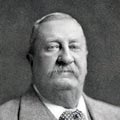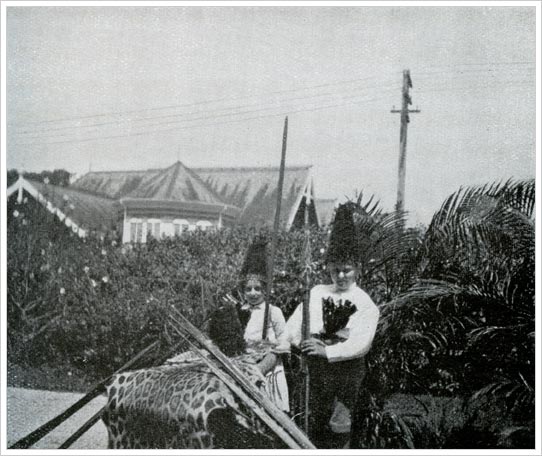From Tipuani to Paroma, Part 13
Some days later we reached the Quillapatuni Pass, which I found much easier walking up than down. We had, of course, to unload the mules, and pass everything over the cable at the River Toro, and then let the mules climb the pass with half loads, which took us two days. We stopped at the same places as on the way in. At the top of the pass, Miguel had another attack of fever, and I was delayed three days, during which I shot two poujil. The shelters there had evidently been occupied within the last day or so, probably by the two men and boy who had wanted to travel with me.
A few days later, when we had just reached the foot of the Illyapo Range, we were astonished to see Perez’ old white mare walking quietly towards the Tipuani, and behind her in single file the two ponies and the mules. Nobody was with them, and there was no cargo or pack saddles on their backs. Three hours afterwards, as we were ascending the high mountain on the way to Tiquiripaga, we saw frozen blood on the path, and about half a mile further on just this side of Tiquiripaga we met four mounted infantry men on mules, who told us that the little boy had met them the day before and said that his two companions had been murdered by three bad Indians who persisted in accompanying them for two days. They had killed the two men and taken the animals that were carrying the rubber. The boy had gone on to Sorata and given the alarm, and the criminals were being pursued. Eventually two of them were found with all the rubber at a small Indian settlement off the road near the foot of the mountain: they were recognized by the boy and brought to Sorata, where they were imprisoned and convicted. The third man escaped.
I stayed at Manuel’s place that night, and two days later reached Sorata. To my surprise, Gunther told me that word had been brought that I had been killed by the Challana Indians, and that the Government was about to send Captain Cusicanque with some soldiers from La Paz to see what had happened. Word was at once sent to General Pardo that I had arrived and was on my way back to La Paz next day; however, I could not continue for two days, as Miguel and Ricardo required a rest. Before leaving I called on Mrs. Villavicencia to give her letters from her brother and husband, and thanked her for writing them. I told her how well I had been received by the Cacique and the Challanas. I picked up my good black mule which I had left here, and rode the rest of the way to La Paz by easy stages, so as to keep with my men and cargo, getting there on the third day after leaving Sorata. I was met by Captain Cusicanque, and taken down at once to see General Pardo, the President, at his private house. He was very pleasant, and congratulated me, saying he was very glad I had succeeded in getting to Paroma and back. He told me I had managed to do what nobody else had been able to do, and said he would certainly give all the Challana Indians their farms and holdings free, but would not recognize the others, many of whom had escaped from justice. He added that if one of his own countrymen had succeeded in doing what I had done, they would have paid him well, and that I had fully earned my commission, and he hoped I would get it. When I had thanked him for his kind remarks, and shown him the paper given me by Villarde, I weighed myself at the President’s house, and found that after walking 857 miles by the register of the speedometer, besides many more miles when I did not carry it, riding 210 miles on a mule, and leading a fairly rough life, I was just 10lbs. less than when I left Peru, which goes to show that a trip of this sort hurts nobody, so long as you don’t get the fever. I had enjoyed the journey there and back very much, although I was not in too happy a frame of mind before the meeting of the Indians after what Villarde had told me. However, after I began to talk with them, that feeling soon wore off.
Before returning to Lima, I stayed a few days at La Paz. Miguel was still having attacks of malaria, so I sent him back to Chili, via Oruro and Antofogasta. I gave the big tiger skin to Mariano Penny at Oruro: the length was measured green, not pegged out, 8ft. 11ins. After crossing Lake Titicaca, I took the Puno Arequipa train and got out at Jura to spend a week at the baths on the way down. I went on to Arequipa and Mollendo, and there caught the steamer to Callao, where I arrived on August 4th, 1904, just about a year after starting. Mr. Beauclerk, the British Minister, told me I was supposed to have been murdered, and showed me Lima and Valparaiso papers. I was pleased to see how kindly they spoke about me, and I shall always be proud of those notices, and the many kind letters of congratulation from merchants, bank managers, and editors of newspapers in Chili and Peru which I received. I showed Villarde’s paper to Mr. A. B. Leguia, the Minister of Hacienda Lima Peru, afterwards one of the best Presidents Peru ever had, who paid me his share of the expenses agreed to in the arrangement I had made with reference to the Challana concession, and wrote to the New Company, asking them to take over the concession on the terms originally stipulated.
I then went home, and did not return to Lima until March of the next year.
When I got there, I found to my disgust that the Company which was to have bought over the concession from the Challana Rubber Company seemed to want to back out of it now. I was asked if I would take their representative from the States to the rubber district of Challana, and at once said I certainly would, provided we took in at the same time the goods ordered by the natives to exchange for rubber; otherwise I would not go. I was not going to go back on my word to Villarde, the Cacique, and the settlers, and I told them the rubber was there, balled up and ready for immediate transport, and if they did not see their way to taking the whole £5,000 worth ordered until they had seen the country and inhabitants and formed their own opinion we might take £1,000 worth of things for a start. But nothing came of it, and the whole deal fell through. Some few years after my return, a Company was registered called the Tongo River Rubber Company. It is a simple matter for others to follow after somebody else has shown the way. The pioneer of any such undertaking, or the prospector for minerals, seldom derives much benefit for the hard times he nearly always has to go through, and the reward is generally reaped by others who would never think of making such ventures until the ways and means were made clear and easy.


And so chapter six ends, and with it Prodgers’ adventures in rubber. In the final third of the book, he goes in search of lost gold.